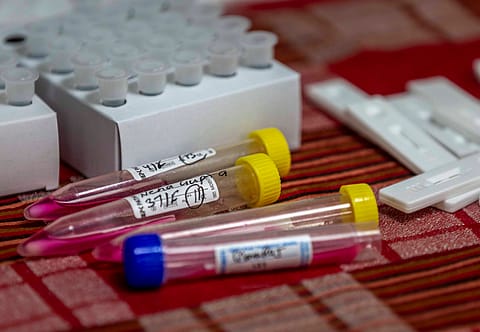New Covid variant Omicron XE detected in India; should you worry?
Omicron XE variant could be 10% more transmissible than Omicron BA.2 variant, which is currently causing massive infections in the U.K., parts of China and the U.S., warn experts.

Even as the Covid graph in India shows a declining trajectory, the first case of a new coronavirus variant called Omicron XE has been reported in Mumbai, the Brihanmumbai Municipal Corporation (BMC) said today. The BMC said another patient has also been infected with the Kappa variant.
The development is serious as the Omicron XE variant could be 10% more transmissible than the Omicron BA.2 variant, which is currently causing massive infections in the UK, warn health experts.
The BMC statement said two patients were infected with XE and Kappa, while 228 were found positive for Omicron of the total 230 samples sent for genome sequencing. The sample data shows that 21 patients were admitted to hospitals with mild symptoms. Of them, 12 had not received the Covid vaccine but 9 had taken both Covid jabs.
What is Omicron XE variant
As per the World Health Organisation (WHO), Omicron XE is the hybrid combination of both sub-variants, BA.1 and BA.2, of a highly infectious Covid variant called Omicron. Omicron XE was first detected in the U.K.. Health officials in the UK have warned that Omicron XE could be the fastest-spreading Covid variant so far, though many experts have tried to allay fears around this new variant.
The U.K. Health Security Agency (UKHSA), in its statement on March 25, had said a total of 637 cases of XE – a recombinant of Omicron BA.1 and BA.2 – have been confirmed in the UK so far. The earliest of these has a specimen date of January 19, 2022.
"There is currently insufficient evidence to draw conclusions about growth advantage or other properties of this variant. We continue to monitor all recombinants closely, routinely through our world-leading genomic surveillance and sequencing capability," the U.K.'s top health body said.
Recommended Stories
What is recombinant variant
A recombinant variant occurs when an individual becomes infected with 2 or more variants at the same time, resulting in a mixing of their genetic material within the patient’s body. This is not an unusual occurrence and several recombinant SARS-CoV-2 variants have been identified over the course of the pandemic.
As with any other coronavirus (Covid-19) variant, the vast majority do not confer any advantage to the virus and die out relatively quickly.
U.K.H.S.A.’s new analysis examines 3 recombinants, known as XF, XE, and XD. Of these, XD and XF are recombinants of Delta and Omicron BA.1, while XE is a recombinant of Omicron BA.1 and BA.2.
(INR CR)
In the U.K., 38 cases of XF have been identified, though none have been seen since mid-February. There is currently no evidence of community transmission within the country. XD has not been identified in the U.K. to date, though 49 cases have been reported to global databases, the majority of them being in France.
WHO on recombinant variants
A recombinant variant erupts when the virus is allowed to circulate at an "intense level". In such situations, the virus continues to evolve and more variants are expected.
Health officials of the WHO have been consistently warning that in the wake of countries opening up everything without any restrictions, recombinants are expected to emerge. "We have been explaining for a very long time," said Maria Van Kerkhove, infectious disease epidemiologist and Covid-19 technical lead at the WHO.
"The recombinant variant is a combination of Delta AY.4 and Omicron BA.1. It's been detected but there are very low levels of this detection. The recombinant itself is something that is expected given the large amount of circulation that we saw with both Omicron and Delta. And given the sheer number of changes and mutations within Omicron, it was much easier for researchers and scientists to be able to detect these recombinants," she said.
On how the world can save itself from emerging mutations, she said while there is some waning immunity over time, Covid-19 vaccines remain incredibly effective to prevent severe disease and death.
"Omicron is dominant around the world, this is not theoretical. The virus continues to evolve. While we increase protection from severe disease with vaccinations, we must also continue to track changes in the virus and take measures to reduce the spread," she added.
She warned that as much as everyone would like to, the Covid-19 pandemic is not over.